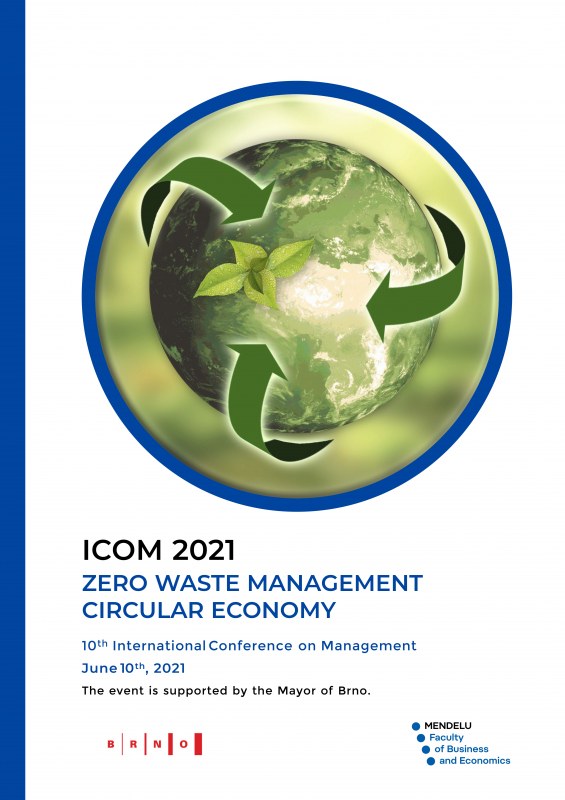
DOI: 10.11118/978-80-7509-820-7-0136
POSSIBILITIES OF WASTE REDUCTION IN GASTRONOMY AND FOOD INDUSTRY IN THE CONTEXT OF CIRCULAR ECONOMY
- Petr STUDNIČKA
The aim of the article is to propose approaches to waste reduction in gastronomy and food industry in the context of the White Paper for Hospitality in Europe: 2019–2024 EU Mandate and the circular economy. White Paper presents the industry´s top five priorities – Collaborative economy, Better regulation, Digital, Food Policy and Social Affairs. The priority Food Policy shows that voluntary measures, as the ones which took the European hospitality industry together with the European Food Banks Federation (FEBA) to reduce food waste and develop food donations, are proving their effectiveness and therefore favourably replace European-wide legislation in this case. Waste in gastronomy and food industry can be classified into two areas, organic and inorganic waste. Organic waste constitutes a percentage of purchased but unused food and directly translates into the finances of customers. Inorganic waste is more dangerous because it is associated mainly with the packaging necessary for packing food to go. The possibilities of reducing waste in gastronomy are summarized based on own primary and secondary research. Better knowledge of options of residual foodstuffs disposing/management could be achived not only by explaining legislation and real options of disposing waste but also by providing various recommendations and ideas to restrict residual foodstuffs and food waste.
Keywords: circular economy, food industry, gastronomy, residual materials, waste management
pages: 136-143, Published: 2021, online: 2021
References
- Calvo-Porral C., Faina M., Losada-Lopez, C. 2017. Can Marketing Help in Tackling Food Waste?: Proposals in Developed Countries. Journal of Food Products Marketing, 23(1): 42-60, DOI: 10.1080/10454446.2017.1244792.
 Go to original source...
Go to original source... - Condamine, P. 2020. Zero Waste Europe. [Online]. Available at https://zerowasteeurope.eu/about/principleszw-europe/ [accessed: 18-04-2021].
- EU-MERCI. 2020. Analysis of Food and Beverage Sector in Different Countries. Available at: http://www.eumerci-portal.eu/documents/20182/38527/10+-+Other+countries.pdf [accessed: 15-04-2021].
- European Commission. 2020. A Farm to Fork Strategy. FAO. [Online]. Available at: http://www.fao.org/agroecology/database/detail/en/c/1277002/ [access: 05-05-2021].
- European Parliament. 2017. Food waste: the problem in the EU in numbers. Available at: https://www.europarl.europa.eu/news/en/headlines/society/20170505STO73528/foodwaste-the-problem-in-the-eu-in-numbers-infographic [accessed: 23-04-2021].
- Fiedor, J. 2012. Odpadové hospodářství - učební text. Ostrava: Vysoká škola báňská.
- Hlavatá, B. 2018. Možnosti zpracování a omezování zbytkových surovin z restaurací. Master Thesis. Praha: Vysoká škola hotelová.
- HOTREC. 2019. White Paper for Hospitality in Europe: 2019-2024 EU Mandate. Brussels: HOTREC.
- IEEP. 2018. Unwrapped: how throwaway plastic is failing to solve Europe's food waste problem (and what we need to do instead). Brussels: IEEP.
- Juvan, E., Grün, B., Dolnicar, S. 2018. Biting Off More Than They Can Chew: Food Waste at Hotel Breakfast Buffets. Journal of Travel Research, 57(2): 232-242. DOI: 10.1177/0047287516688321.
 Go to original source...
Go to original source... - Kebová, B. 2020. Cirkulární ekonomika v gastronomii. Available at: https://hub.cirkularnicesko.cz/wp-content/uploads/2020/06/Webinář_CE-vgastronomii_ppt.pdf [accessed: 22-04-2021].
- Korhonen, N. et al. 2018. Circular Economy: The Concept and Its Limitations. Ecological Economist, 143: 37-46. DOI: https://doi.org/10.1016/j.ecolecon.2017.06.041
 Go to original source...
Go to original source... - McIntosh, R. I. et al. 2010. Late customisation: issues of mass customisation in the food industry. International Journal of Production Research, 48(6): 1557-1574. DOI: 10.1080/00207540802577938.
 Go to original source...
Go to original source... - Murray, R. 2002. Zero Waste. Londin: Greenpeace Publications.
- Nestle, M. 2013. Food Politics: How the Food Industry Influences Nutrition and Health. Berkeley: University California Press.
- Ofei, K. T. et al. 2015. Reducing Food Waste in Large - Scale Institutions and Hospitals: Insights From Interviews With Danish Foodservice Professionals. Journal of Foodservice Business Research, 18(5): 502-519. DOI: 10.1080/153780020.2015.1093457.
 Go to original source...
Go to original source... - Plzáková, L., Studnička, P. 2021. Local Taxation of Tourism in the Context of the Collaborative Economy - Case Study from the Czech Republic. Lex Localis - Journal of Local-Self Government, 19(1): 65-89. DOI: 10.4335/19.1.65-89(2021).
 Go to original source...
Go to original source... - Plzáková, L., Stupková, L. 2019. Determination of Key Factors of Health and Well-Being Tourism Destinations. Granada: IBIMA.
 Go to original source...
Go to original source... - Collection of Laws. 2001. The Act of 14 June 2001 Waste Law. No 185 Item 71.
- Collection of Laws. 2016. The Decree of 31 March 2016 Catalogue of Waste. No 93 Item 38.
- Vezérová, K. 2021. Možnosti snižování odpadu v gastronomii a potravinářství v kontextu cirkulární ekonomiky. Masters Thesis. Praha: Vysoká škola hotelová.


